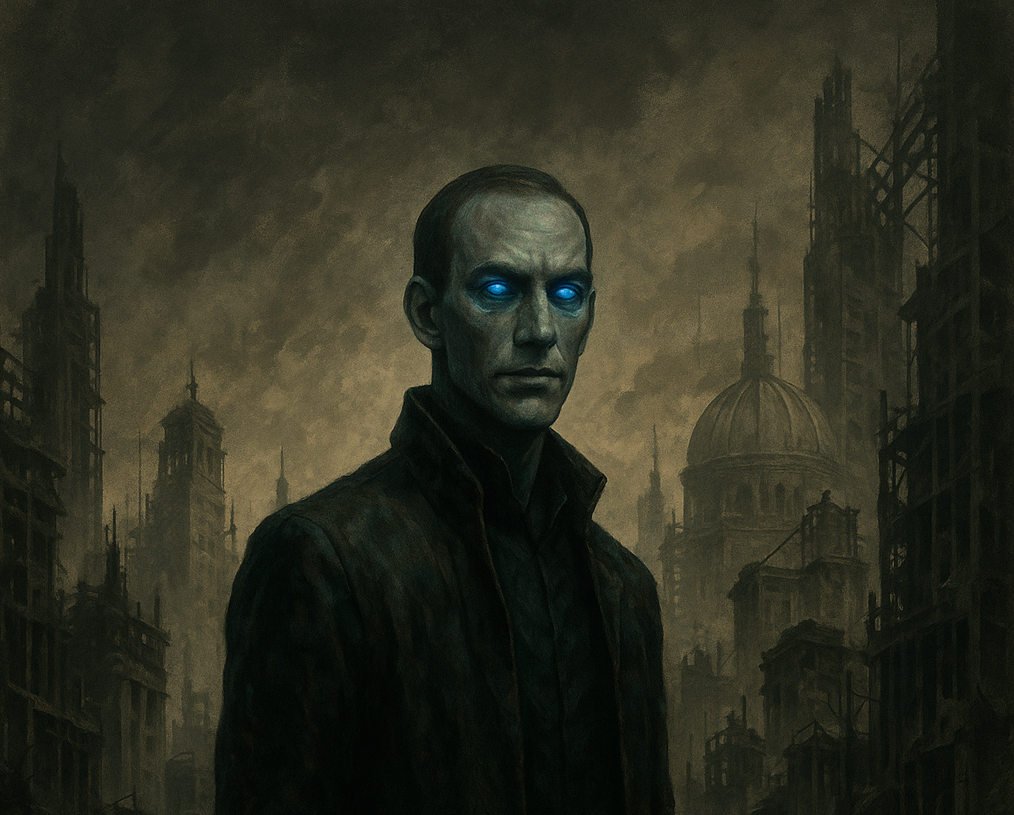
Title: The Last Architect - By Mikel J. Chavez | Cat# 122122
He called himself Arin in the earliest days, back when the sky was still thick with ash and the last of the great lizards thundered across the earth. He had no true name in any language spoken here, and no true form that stayed fixed for long. Arin was one of the Keplari, a curious and ancient species from a water-rich world orbiting the star you call Kepler-186. He came to earth alone on a research mission, expecting to observe briefly and leave. But the world caught him. Its chaos. Its beauty. Its endless potential.
For ages he wandered the continents, keeping himself hidden behind faces of his own making. Sometimes he was a hunter in a small tribe, sometimes a woman who gathered herbs near a river, sometimes a wandering stone-carver who whispered blueprints into the minds of people not yet ready to draw a straight line. He learned every rhythm, every weakness, every burst of brilliance the human mind could hold.
And every time humanity reached a plateau, he nudged them upward.
Arin’s method was simple. Once he mastered a new discipline, he distilled the essence of its understanding into a microscopic genetic marker, a strand of alien code. Then he released it into the world’s waters. The marker sought out the humans most capable of carrying that knowledge. It didn’t give them answers, but it opened doors in their minds. Agriculture. Medicine. Writing. Architecture. Electricity. Vaccines. Microchips. Every major leap forward began as a silent ripple from one wandering alien who walked among us.
He watched empires collapse and rise again. He walked battlefields and libraries. He stood on mountaintops pondering what the next age might look like. He loved this strange species more than he had ever intended.
But no amount of foresight prepared him for the day the mammoths returned.
It began as a curiosity. Researchers uncovered frozen tissue in a glacier and revived fragments of ancient DNA. Arin sensed something wrong before anyone else did, but for the first time in millions of years, he hesitated. He took the form of a scientist to investigate, but the virus came for him before he could isolate it. It was old. Primal. Perfectly adapted to organisms from the Keplar system. It leapt to him within hours.
His cells fought, reshaped, burned. His mind flickered. By the time he collapsed in the snow, he knew. He wasn’t going to heal.
And humanity would never know what they had lost.
The world moved on, unaware its invisible architect had died in a remote research station, body dissolving into harmless dust. At first nothing seemed different. Days passed. Then months. Then years. Progress slowed. Innovations stalled. Creativity dulled at the edges.
Humanity didn’t understand why the breakthroughs stopped. Why discoveries dried up. Why every field felt like trudging through mud. Without Arin’s markers seeding the next great insight, the species that had once leapt forward now stumbled.
Governments panicked. Industries collapsed. Blame spread like wildfire. Rivalries sharpened. Nations fractured. The world turned inward, petty and fearful. The great engines of progress rusted. Cities decayed. The global web of ideas shrank into tribal islands of suspicion and stagnation.
People whispered that the golden ages were over. That something sacred had been severed. No one knew the truth: that the mind guiding humanity for millions of years had vanished, leaving behind a species that never learned how to reach the stars on its own.
Somewhere, beneath a glacier that would one day melt, a few grains of alien dust slept quietly, unaware of the collapse above. And humanity alone for the first time in its history returned to what it had been before Arin ever set foot on the planet.
A brilliant, fragile species with infinite potential.
And no map to reach it.
© 2025 Mike Chavez. All rights reserved.
